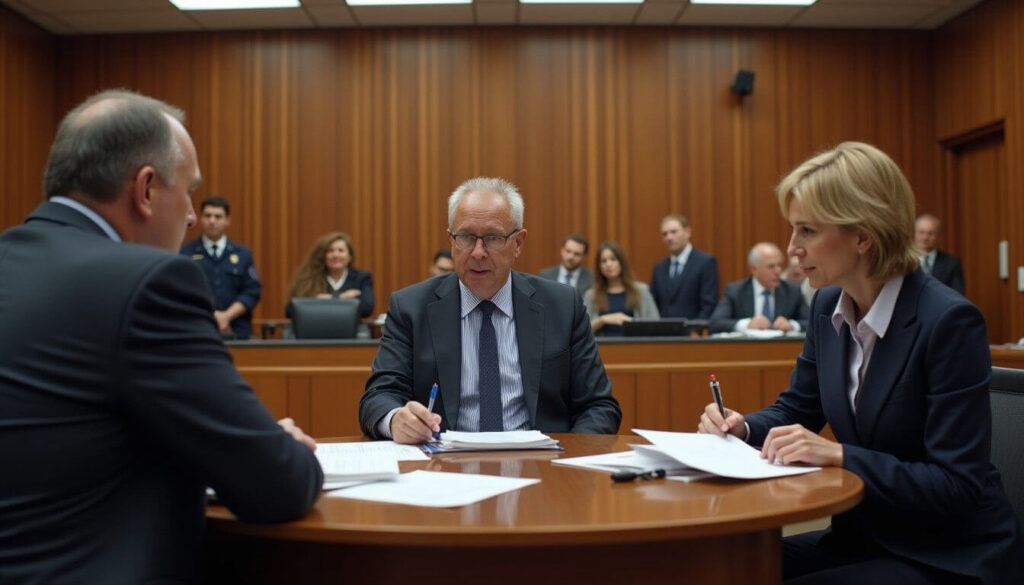
We've helped businesses save $55m with our all-in-one platform. Get instant access to this template and 115+ others, plus AI-powered document creation, starting completely free.
A hearing in court is a formal legal proceeding where a magistrate or judge reviews a case, considers legal arguments, and makes rulings on procedural or substantive matters. Hearings play a crucial role in the legal system, helping to resolve disputes, manage case progression, or determine if a matter should proceed to trial.
Courts conduct different types of hearings based on the nature of the case, including criminal, civil, and family law matters. Some hearings focus on preliminary legal issues, while others involve reviewing evidence or hearing witness testimony. Each hearing follows specific rules and procedures, with varying formality levels depending on the case type.
Proper preparation is key to navigating a hearing in court effectively. Understanding the court process, knowing what to expect, and ensuring all necessary documents and arguments are ready can lead to a smoother experience and a fairer outcome.
A hearing in court serves different purposes depending on the case type. Some hearings address procedural steps, such as setting trial dates, while others involve evidence presentation and legal arguments. Courts apply specific rules and procedures to ensure a structured process, with some hearings requiring only legal submissions while others involve witness testimony and evidence review.
The level of formality varies—certain hearings are brief and focus on case management, while others play a critical role in deciding case outcomes. Understanding the purpose of the hearing and preparing accordingly helps ensure an efficient and fair legal process.
[ez-toc]
A hearing in court is a legal proceeding where a judge, magistrate, or tribunal reviews legal issues, resolves disputes or makes procedural decisions. Some hearings focus on case management, while others determine whether a case should proceed to trial.
Unlike a trial, a hearing is generally less formal and may not require full evidence to be presented. Some hearings involve only legal arguments, while others include witness testimony or preliminary evidence. In some instances, a hearing officer or magistrate makes a ruling; in others, the matter may proceed to a higher court for further review.
The comparison table below highlights key differences between a hearing and a trial:
FeatureHearingTrialPurposeDetermines legal issues or case managementDecides guilty or not guilty or liabilityDurationShort (hours to days)Long (weeks to months)EvidenceLimited or preliminary hearingFull evidence at a committal and witness testimonyOutcomeA court may issue rulings or the court makes case management decisionsA judge and jury or magistrate or judge give a final verdict
The case may proceed to trial if a hearing does not resolve the issue. Understanding these distinctions helps parties prepare for court proceedings and effectively present their case.

A court hearing follows a structured process. The steps depend on the type of hearing, the issues in dispute and the case's complexity. Some hearings are brief, while others involve detailed legal arguments and evidence to the court.
Most hearings follow this order:
Each hearing varies. A hearing officer or magistrate manages the process to ensure fairness and efficiency.

The judge or commissioner controls the hearing. Their role includes:
Each party in a hearing in court has the opportunity to present their case through legal arguments, evidence, or witness testimony. Depending on the type of hearing, this may involve:
Some hearings involve only lawyers, while others require parties to attend court and speak for themselves. Individuals may choose to have legal representation or represent themselves.
For complex matters, seeking legal advice early can help ensure a fair and effective case presentation.
At the end of a hearing, the court may:
Understanding these steps helps parties prepare for their court case. Whether the matter involves criminal proceedings or civil disputes, knowing what to expect can help individuals and lawyers navigate the court process effectively.
A courtroom is a formal setting where a hearing is held. Everyone involved must follow proper procedures and respect the court process. The courtroom layout may vary but generally includes key figures such as the magistrate or judge, court staff and legal representatives.
A courtroom has specific areas for different participants. The main sections include:
All participants must follow proper conduct. The court expects:
Before attending court, each party should know their rights and responsibilities. A lack of preparation can affect the outcome. If someone is unsure about their case, seeking legal services may help. Courts provide some guidance, but they do not usually offer legal advice.
Individuals can confidently approach their hearing or trial by knowing what to expect inside the courtroom. Proper preparation ensures a smoother process and improves the chance of a fair outcome.
Courts hold different types of hearings depending on the court case. Some hearings focus on procedural steps, while others decide legal outcomes. The kind of hearing depends on whether the matter involves criminal, civil, or family law.
Hearing TypePurposeCommon OutcomeMention hearingDetermines next steps in a case in courtSets dates, requests documents or refers to trialBail hearingDecides if an accused person should be released before trialGrants or denies bail based on risk factorsCommittal hearingEvaluates if there is enough evidence at a committal for trialDismisses case or refers it to a higher courtCivil hearingResolves disputes between individuals or businessesSettlement, ruling or referral to district or supreme courtsFamily court hearingDeals with parenting, divorce and financial disputesMediation, temporary orders or final judgment
An indictable offence is a serious criminal charge that usually requires a trial in a higher court. These offences include crimes such as assault, drug trafficking and homicide. Because of their severity, they involve more complex court proceedings and harsher penalties than summary offences.
Indictable offences follow a different court process than minor crimes. A court hearing for an indictable offence often involves multiple stages, including a committal hearing.
FeatureIndictable OffencesSummary OffencesCourtDistrict or supreme courtsLocal or magistrates’ courtsJudge and juryA jury is empanelled for trialsNo jury; the magistrate or judge decidesHearing processIncludes committal hearings, trials and possible appealsUsually finalised in one hearingOutcomeIf the person is found guilty, they may face lengthy prison termsFines, community service or short prison terms
A committal hearing helps decide if there is enough evidence at a committal for the case to go to a higher court. The magistrate reviews key facts, including:
If the court considers the evidence weak, the case may not proceed. If strong enough, it moves to trial, where a judge and jury decide.
Anyone charged with an indictable offence should seek legal services. A lawyer helps the accused person understand their rights and prepare their defence. A lawyer can argue for a lighter sentence if someone chooses to plead guilty. The stakes are high, so strong legal advice can impact whether a matter goes to trial or is resolved earlier.
A case management conference is a meeting held before a court hearing to organise and manage a court case. Courts use these conferences to ensure cases move efficiently through the legal system. They help parties resolve disputes early, narrow down key issues, and prepare for the final hearing if necessary.
Case management conferences are typical in civil hearings and family court hearings. They provide a structured way to address procedural matters before a case reaches a trial or hearing is held. Courts use these conferences to:
A case management conference serves several key purposes, including:
Courts use these conferences to allocate resources fairly. A judge or commissioner reviews each case and decides the best course of action. The court may set deadlines, dismiss unnecessary claims or refer the case to a higher court if needed.
By improving preparation, a case management conference helps the court make better use of time and ensures the hearing or trial runs smoothly. If a case does not settle, the judge will decide on the next steps before the court commences formal proceedings.
Understanding legal rights and court procedures is essential when attending a hearing in court. Several legal services are available to help individuals navigate the process.

Early legal advice improves case preparation and increases the chances of a fair outcome. A lawyer can:
Accessing the proper legal support ensures individuals understand their case and effectively navigate the court process.
A court hearing allows a magistrate or judge to assess legal and factual issues before deciding. The court must apply issues of law fairly while considering the particular circumstances of each court case. The outcome depends on the strength of legal arguments, the reliability of witnesses and compliance with court rules.
A judge or commissioner reviews several key factors when making a ruling:
A magistrate or judge must apply the law while ensuring a fair hearing. They consider whether both parties had an equal chance to present their case. If one party lacks legal knowledge, the court officer may provide procedural guidance, but the court does not usually offer legal advice.
Different court rulings lead to other legal outcomes. Examples include:
A court hearing can decide minor issues or determine if a matter is heard at trial. Each case is unique, and the court makes decisions based on law and fairness.
If you are required to attend, you must stay unless the court permits to leave the court. Witnesses may wait outside the court until they are called. Defendants or plaintiffs must remain unless the court allows them to go after their part is done.
Only legal representatives or self-represented parties can address the jury in trials. In most hearings, there is no jury, and a matter is heard by a judge or magistrate.
Australian courts often acknowledge the traditional owners at the start of formal proceedings. This honours the traditional owners and custodians of the land where the hearing takes place.
Understanding the court process helps people prepare for a hearing and improves their chances of a fair outcome. While most court hearings follow similar structures across Australia, each jurisdiction has specific procedures based on state laws and court rules. Knowing what to expect and how to present their case makes the process easier.
A court hearing follows a structured process. The magistrate or judge considers legal arguments, witness credibility, and procedural rules before making a decision. Some hearings resolve issues quickly, while others lead to a final hearing or trial.
Legal advice can impact the outcome of a court case. A lawyer helps with documents, explains legal rights, and ensures that parties follow court proceedings correctly. Legal aid services, community legal centres, and pro bono programs can provide guidance if hiring a lawyer is not an option.
Copyright © 2025 Business Kitz 14312161